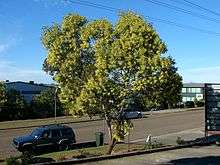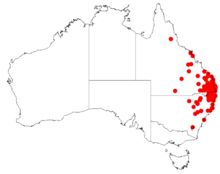Acacia concurrens
Acacia concurrens, commonly known as curracabah or black wattle, is a shrub native to Queensland in eastern Australia.[1]
| Curracabah | |
|---|---|
 | |
| Scientific classification | |
| Kingdom: | Plantae |
| Clade: | Tracheophytes |
| Clade: | Angiosperms |
| Clade: | Eudicots |
| Clade: | Rosids |
| Order: | Fabales |
| Family: | Fabaceae |
| Clade: | Mimosoideae |
| Genus: | Acacia |
| Species: | A. concurrens |
| Binomial name | |
| Acacia concurrens | |
 | |
| Occurrence data from AVH | |
Formerly known as Acacia cunninghamii, the new name Acacia concurrens describes the converging primary veins on the phyllodes.[2] It is very similar to Acacias such as Acacia leiocalyx and Acacia disparrima.
Description
The shrub can grow as high as 10 m (33 ft) but is typically smaller. The glossy green phyllodes have an obliquely obovate shape with the lower margin that is almost straight.[3] It has fissured and fibrous, grey-black coloured bark and stout, angular branchlets The phyllodes have a length of up to 16 cm (6.3 in).[2] It blooms between March and September producing rod shaped flowers are bright yellow that are found in pairs in the leaf axils.[3] The flower-spikes are around 3.5 to 11 cm (1.4 to 4.3 in) in length. The linear, slightly moniliform, semicircular seed pods that form after flowering are 5 to 10 cm (2.0 to 3.9 in) in length. The pods contain brownish black seeds with an elliptic shape that are 3.5 to 4.5 mm (0.14 to 0.18 in) in length.[4]
Taxonomy
The species was first formally described by the botanist Leslie Pedley in 1974 as part of the work Contributions from the Queensland Herbarium . It was reclassified as Racosperma concurrens in 1986 by Pedley then transferred back to genusAcacia in 2001.[5]
Distribution
It is endemic to an area from south eastern Queensland in the north to northern New South Wales in the south[3] where it is common in coastal areas from around the Mooloolah River in Queensland down to the Hastings River in New South Wales[4] on hillsides or plateaux growing in sandy or stony sandy loams often over shale as part of the understorey in Eucalyptus forest communities.[2]
See also
References
- "Acacia concurrens Pedley". Australian Plant Name Index (APNI), IBIS database. Centre for Plant Biodiversity Research, Australian Government.
- "Acacia concurrens (MIMOSACEAE) Black Wattle, Curracabah". Save our waterways now. Retrieved 27 July 2019.
- "Acacia concurrens". Wattles - genus Acacia. Australian National Botanic Gardens. Retrieved 27 July 2019.
- "Acacia concurrens Pedley". Wattles - Acacias of Australia. Lucid. Retrieved 27 July 2019.
- "Acacia concurrens Pedley Curracabah". Atlas of Living Australia. Global Biodiversity Information Facility. Retrieved 27 July 2019.